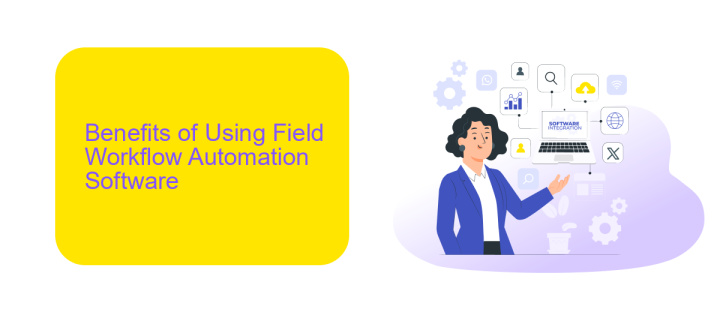Field Workflow Automation Software
Field Workflow Automation Software is revolutionizing how businesses manage their on-site operations. By streamlining processes, enhancing communication, and reducing manual tasks, this technology boosts efficiency and productivity. From real-time data collection to automated reporting, companies can now achieve greater accuracy and faster decision-making, ultimately leading to improved performance and customer satisfaction. Discover the transformative power of field workflow automation in today's competitive landscape.
Introduction to Field Workflow Automation Software
Field Workflow Automation Software streamlines and optimizes tasks for field workers, ensuring that operations run smoothly and efficiently. By automating repetitive tasks, businesses can save time, reduce errors, and improve productivity. This software is essential for industries like construction, utilities, and maintenance, where field operations are a critical part of the business.
- Automates routine tasks and data entry
- Enhances communication and collaboration among team members
- Reduces operational costs and minimizes errors
- Provides real-time data and analytics for better decision-making
- Ensures compliance with industry standards and regulations
Integrating various services and tools into the workflow automation software can further enhance its capabilities. For instance, services like ApiX-Drive facilitate seamless integration with other applications, allowing for a more cohesive and efficient workflow. By leveraging such integrations, businesses can ensure that their field operations are not only automated but also interconnected and responsive to changing needs.
Benefits of Using Field Workflow Automation Software

Field workflow automation software significantly enhances operational efficiency by automating repetitive tasks, reducing human error, and ensuring consistent data collection. This leads to faster decision-making and improved productivity as employees can focus on more strategic activities rather than manual data entry. The software also provides real-time insights and analytics, helping managers to monitor field operations closely and make informed decisions promptly.
Additionally, field workflow automation software improves communication and collaboration among team members by streamlining processes and providing a centralized platform for data sharing. Integration with other tools and services, such as ApiX-Drive, further extends its capabilities by enabling seamless data transfer between different applications. This ensures that all systems are synchronized, reducing the need for manual updates and minimizing the risk of data discrepancies. Ultimately, the use of field workflow automation software leads to enhanced accuracy, efficiency, and overall business performance.
Types of Field Workflow Automation Software

Field workflow automation software comes in various types, each designed to streamline specific tasks and processes in different industries. These software solutions help organizations enhance efficiency, reduce errors, and improve overall productivity. Here are some common types of field workflow automation software:
- Task Management Software: This type of software helps in assigning, tracking, and managing tasks among field workers. It ensures that tasks are completed on time and provides real-time updates on progress.
- Inspection and Audit Software: Used for conducting inspections and audits in the field, this software allows users to capture data, generate reports, and ensure compliance with industry standards.
- Inventory Management Software: This type helps in tracking and managing inventory levels, orders, and supplies in the field. It ensures that field workers have the necessary materials to perform their tasks efficiently.
- Integration Platforms: Services like ApiX-Drive facilitate the integration of various field workflow automation tools, allowing seamless data transfer and synchronization between different systems.
Each type of field workflow automation software serves a unique purpose, catering to the specific needs of different industries. By choosing the right software, organizations can significantly enhance their operational efficiency and achieve better outcomes in their field operations.
How to Choose the Right Field Workflow Automation Software

Choosing the right field workflow automation software is crucial for optimizing your business operations. Begin by identifying your specific needs and challenges. Consider what tasks you want to automate and how the software can address these requirements.
Next, evaluate the features and functionalities of different software options. Look for solutions that offer robust reporting, real-time updates, and user-friendly interfaces. Integration capabilities are also vital; ensure the software can seamlessly connect with your existing systems.
- Scalability: Can the software grow with your business?
- Customization: Does it allow for tailored workflows?
- Support: What level of customer service is provided?
- Integration: Can it integrate with tools like ApiX-Drive for streamlined processes?
Lastly, consider the cost and ROI. While it might be tempting to go for the cheapest option, investing in a more comprehensive solution can save money in the long run. Test the software through demos or trials to ensure it meets your expectations before making a final decision.
- Automate the work of an online store or landing
- Empower through integration
- Don't spend money on programmers and integrators
- Save time by automating routine tasks
Implementation and Best Practices for Field Workflow Automation
Implementing field workflow automation software requires a strategic approach to ensure seamless integration and maximum efficiency. Begin by thoroughly assessing your current workflows to identify bottlenecks and areas that would benefit most from automation. Engage with key stakeholders to understand their needs and expectations. Choose a robust software solution that aligns with your business objectives and offers flexibility for future growth. Comprehensive training for your team is essential to guarantee smooth adoption and minimize resistance to change.
Best practices for successful implementation include starting with a pilot program to test the system and gather feedback, which can then be used to make necessary adjustments before a full-scale rollout. Utilize integration services like ApiX-Drive to connect disparate systems and streamline data flow across platforms. Regularly monitor the performance of the automated workflows and gather user feedback to continuously improve the system. Documentation and ongoing support are crucial to address any issues promptly and maintain the efficiency of the automated processes.
FAQ
What is Field Workflow Automation Software?
How can Field Workflow Automation Software benefit my business?
Is it difficult to integrate Field Workflow Automation Software with existing systems?
What features should I look for in Field Workflow Automation Software?
How secure is Field Workflow Automation Software?
Routine tasks take a lot of time from employees? Do they burn out, do not have enough working day for the main duties and important things? Do you understand that the only way out of this situation in modern realities is automation? Try Apix-Drive for free and make sure that the online connector in 5 minutes of setting up integration will remove a significant part of the routine from your life and free up time for you and your employees.


